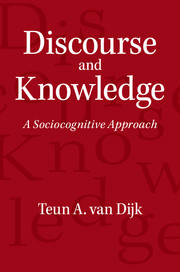Book contents
- Frontmatter
- Contents
- List of figures
- List of tables
- Acknowledgment
- 1 Introduction
- 2 Elements of a theory of natural knowledge
- 3 Discourse, knowledge and cognition
- 4 Discourse, knowledge and social cognition
- 5 Discourse, knowledge and society
- 6 Discourse, knowledge and culture
- 7 Language, discourse and knowledge
- 8 Conclusions
- References
- Index
6 - Discourse, knowledge and culture
Published online by Cambridge University Press: 05 August 2014
- Frontmatter
- Contents
- List of figures
- List of tables
- Acknowledgment
- 1 Introduction
- 2 Elements of a theory of natural knowledge
- 3 Discourse, knowledge and cognition
- 4 Discourse, knowledge and social cognition
- 5 Discourse, knowledge and society
- 6 Discourse, knowledge and culture
- 7 Language, discourse and knowledge
- 8 Conclusions
- References
- Index
Summary
Introduction
A relativist conception of knowledge associates the justification of beliefs with the variable criteria of epistemic communities. In the previous chapter, we have seen that such is the case for different communities of society, for instance for scientific or professional communities. In this chapter, we extend that argument to cultural communities, especially also those in non-Western societies.
Epistemic criteria and authorities in Ancient Greece, the European Middle Ages and in most Western and non-Western cultures today, have changed continuously. Indeed, one of the many ways to define culture would be in terms of its epistemic standards. What is knowledge about spirits or angels, or the assumed influence of one or more gods or ancestors in everyday life, for the members of one (sub)culture may be seen as superstition or mere religious belief by those of other (sub)cultures, as was the case in traditional anthropology talking about the beliefs of “savages” (e.g., in Frazer, 1910).
Whereas today, in many cultures, knowledge is defined as such by scientists or other experts, before and elsewhere it may have been what was declared as justified true belief by priests, gurus or school boards, as we know from creationist ideas about evolution in the USA. In that sense, all knowledge is local, indigenous or folk knowledge. Despite important differences between everyday and scientific thinking, between Our knowledge and Their knowledge, especially as to their contents and methods, the fundamental processes involved are very similar (Kuhn, 1996: 280).
- Type
- Chapter
- Information
- Discourse and KnowledgeA Sociocognitive Approach, pp. 167 - 221Publisher: Cambridge University PressPrint publication year: 2014

